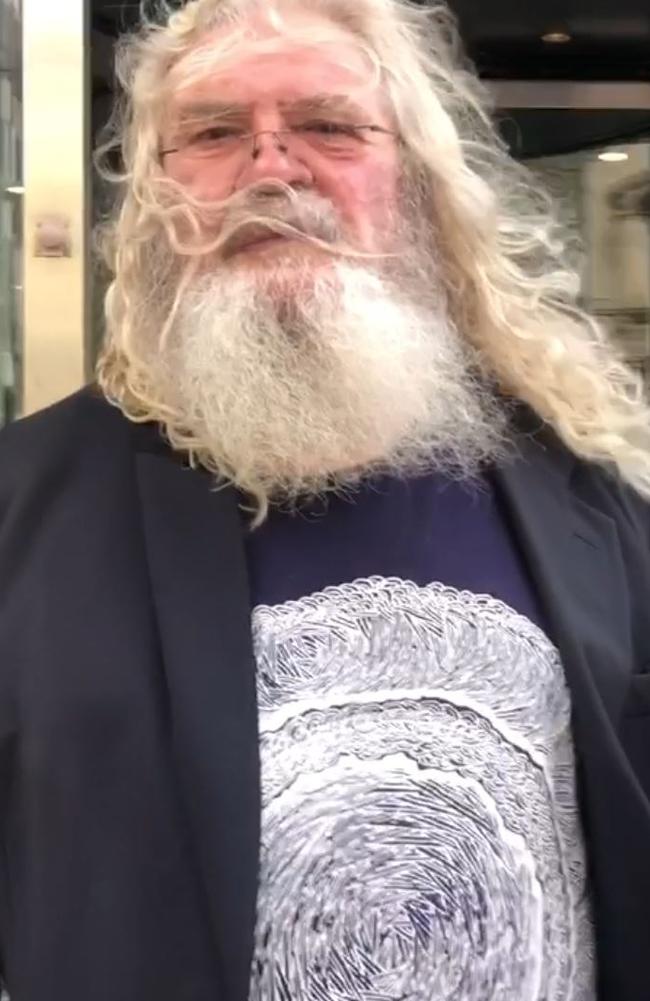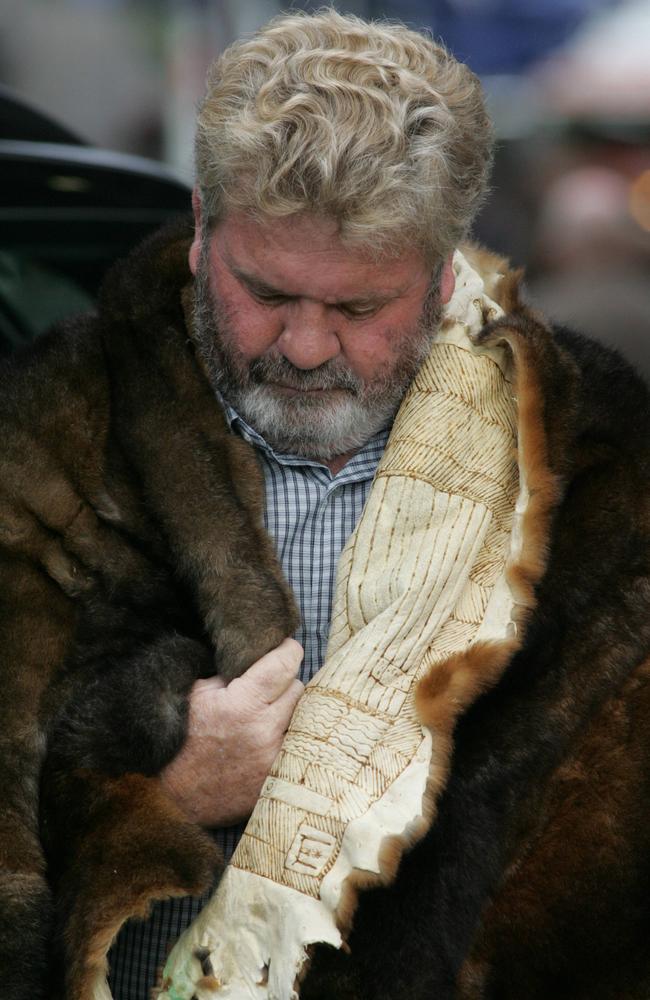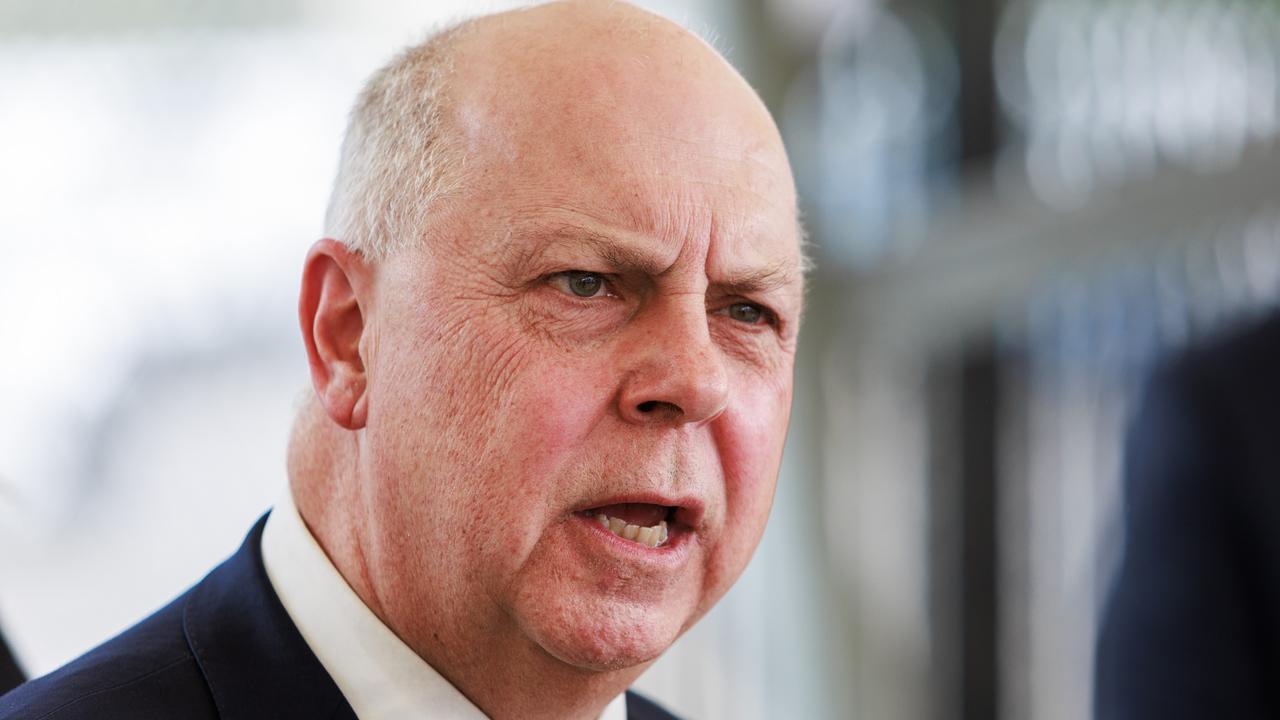How disgraced Indigenous leader Geoff Clark lived a ‘double life’
Geoffrey Clark grew up on an Indigenous settlement in southwest Victoria and rose to fame as a voice for the Aboriginal people of Australia — but while he was doing good work, he was committing a dark string of crimes.

News
Don't miss out on the headlines from News. Followed categories will be added to My News.
Among Geoff Clark’s earliest memories is living in a timber hut with no electricity, town water or sewerage.
He would watch his grandmother weave traditional baskets and would go hunting and eel fishing.
It was a simple life in Framlingham, an Indigenous settlement on the outskirts of Warrnambool in Victoria’s southwest.
But it was his safe haven – a place he was taken to for his own protection.
Being born mixed-race, his family wanted to hide him from authorities in fear he would be snatched from them.
It was at this bush outpost that his passion for the rights of Aboriginal people would ignite.
Sitting around the campfire, he would listen to elders speak of their culture, history and the atrocities committed against them.
Fast-forward to the year 2000, and Clark, then 47, had risen to such fame he became known as the second best Indigenous Australian behind Cathy Freeman.
In the same year she delivered Australia’s greatest sporting moment, taking out gold in the 400-metre sprint at the Sydney Olympics, Clark was also in the New South Wales capital, leading a march of 250,000 people across the Sydney Harbour Bridge.

The bridge walk was in support of reconciliation between Indigenous people and the wider community and put a treaty back on the national agenda.
He was hailed a hero, a voice for the Aboriginal people of Australia.
As the chair of the Aboriginal and Torres Strait Islander Commission, he rubbed shoulders with politicians across the world, including Nelson Mandela and the Dalai Lama.
He would leave Framlingham for the big smoke in Canberra and visit Kirribilli House in Sydney to speak to the nation’s prime ministers on many occasions.
He zeroed in on the rights of Aboriginal people and their overrepresentation in prison and the courts.
Sitting on many land council boards, he was also a key figure in the movement for Indigenous self-determination and land rights.

But there was a dark side to Clark, and his reputation soon after began to sour.
Allegations of rape, misconduct and a pub brawl surfaced, sparking multiple complex legal proceedings against him in the early 2000s.
In 2004, he was sacked from the $240,000-a-year ATSIC role and the commission was disbanded, leading him to launch unfair dismissal proceedings against the Commonwealth.
With multiple court cases on foot, Clark turned to his community for help to pay his mounting legal costs, with a “fighting fund” raking in $40,000.

He claims he was also forced to sell cattle he owned to pay his lawyers.
But it wasn’t enough.
And Clark, unbeknown to his community, dipped his hands into the accounts of Kirrae Whurrong Community Inc, Maar Land Council and Framlingham Aboriginal Trust – three Aboriginal groups he had control of.
He stole $404,344 to pay for his legal fees: $229,344 from KWCI; $150,000 from MLC; and $25,000 from FAT.
In 2018, following a six-year Victoria Police investigation, he was charged with more than 300 offences over allegations of misappropriating $2m.
The death of a barrister involved in the case, followed by the Covid pandemic which saw criminal trials suspended amid lockdowns, caused excessive delays in his case.
Since October last year, Clark has faced three separate County Court trials, where he was found guilty of 25 offences, including defrauding $922,214.92.
Among the charges a jury convicted him on was 17 counts of theft, four of obtaining financial advantage by deception, two of perjury and one each of knowingly deal with proceeds of crime and giving false testimony.
Crown prosecutor Justin Lewis told the court at a pre-sentencing hearing this week how Clark had been living “a double life”.
“He has been offending in parallel with doing good work over a period of many years,” Mr Lewis said.

Outlining his crimes, Mr Lewis said Clark’s “sense of entitlement” saw him steal funds to not only pay his legal fees, but also his household expenses, including rates, electricity and water bills.
He also illegally accepted royalties from eel fishermen, pocketed rent money paid in cash by a tenant who was leasing a KWCI property, and lied about his assets to the Federal Court when applying for bankruptcy in 2009.
The bankruptcy application came at a time when he was being chased by the lawyers of his alleged rape victim for $20,000 compensation a court ordered him to pay her in February 2007.
She has reportedly never received a cent from him, despite a civil jury finding he led two pack rapes against her.
He was never criminally charged over the allegations.
Clark was charged over another alleged rape, but the charges were struck out by a magistrate due to insufficient evidence.
Clark had denied the allegations.

In 2011, at a time when his grip on the Framlingham Aboriginal Trust was slipping, Mr Lewis said, Clark had $400,000 transferred from its accounts into KWCI without authority from the committee.
“The fraud was enacted to enable Geoffrey Clark to hold on to power at Framlingham,” he said.
An independent audit was commissioned after complaints were made to Aboriginal Affairs Victoria about his management of the trust.
The trust was forced to issue civil proceedings against Clark and the money was later returned.
But Clark was found guilty of committing perjury during those proceedings, after he lied about his FAT shareholdings in a sworn affidavit.

Born in Carlton in 1952 to an Indigenous mother and Scottish father, Clark’s lawyer Simon Kenny told the court he was taken to Framlingham between three to six months of age to be raised by his grandmother.
“His Aboriginality – his experience of life growing up in an Aboriginal community was not a matter of choice,” Mr Kenny said.
“As he understands it, because of the policy of taking children away … he said any children born white would be taken away to the bush so they weren’t taken away.”
His mother stayed in Melbourne where she lived a difficult life on the streets, Mr Kenny said, and Clark had little contact with his father.
Clark finished year 11 in Warrnambool, recalling how he was often questioned about his Aboriginality and being “too white”.
“The racism he faced as a young man strengthened his sense of identity and pride as an Aboriginal man,” Mr Kenny said.
“He’s devoted his entire life to advancing the interest of Aboriginal people in Australia through tireless advocacy and activism of Aboriginal rights.”

He said Clark had spent all his life at Framlingham, apart from six years from 1973 when he moved to Perth to play in the WA Football League.
On his return in 1979, he took on the role as Framlingham’s administrator.
“Mr Clark was at that time someone (whose) only life experience was as a footballer,” Mr Kenny said.
“He had no experience or skills and decided to take up the job to give it his best shot – to promote the community’s best interest.”
He would raise his family there, having three sons with his wife Trudy, who was also charged but the case against her was discontinued.
Their son Jeremy Clark, 51, who took over as FAT chief executive when his father became ATSIC boss, was put on trial alongside his father.
The jury convicted him of false accounting and six counts of theft, relating to him helping his dad steal more than $230,000 from KWCI, MLC and Gariwerd Enterprises Ltd, to go towards his legal fees between February 2003 and December 2004.
He also pleaded guilty to obtaining a $10,780 grant from the federal government by deception.
In a statement, Jeremy Clark said he “made an error of judgment and unreservedly apologise”.
He pointed out he did not personally benefit from his crimes.

Framlingham community member Billy McGuinness grew up under the reign of the Clark family, and said Geoff and his sons lived “successful lives” in comparison to the rest of the community “due to his fraudulent activities”.
“It’s been 40 years of Geoff and his family being in charge and (having) the final and only word in the community,” Mr McGuinness told the court.
“Geoff dominated here in everything, and it was his way or the highway.”
He said Clark would shut down anyone who tried to speak the truth, claiming they were “drug-f---ed” or “grog-f---ed”.
“Geoff has greed and hatred toward his own people,” Mr McGuinness said.
Mr McGuinness, 35, said Clark had shown no remorse for his crimes, and continued to walk around with his head held high.
“Geoff has not just spiritually hurt our people, but financially raped us for decades,” he said.
Since he was charged, Clark has remained at his home in Framlingham – a 500ha parcel of traditional land which now comprises 17 houses occupied by about 65 residents.
That was until Thursday, when Judge Michael O’Connell revoked his bail, and ordered he go to jail.
Judge O’Connell will outline how long for when he sentences him at a later date.
His crimes carry a maximum penalty of 20 years.
More Coverage
Originally published as How disgraced Indigenous leader Geoff Clark lived a ‘double life’




